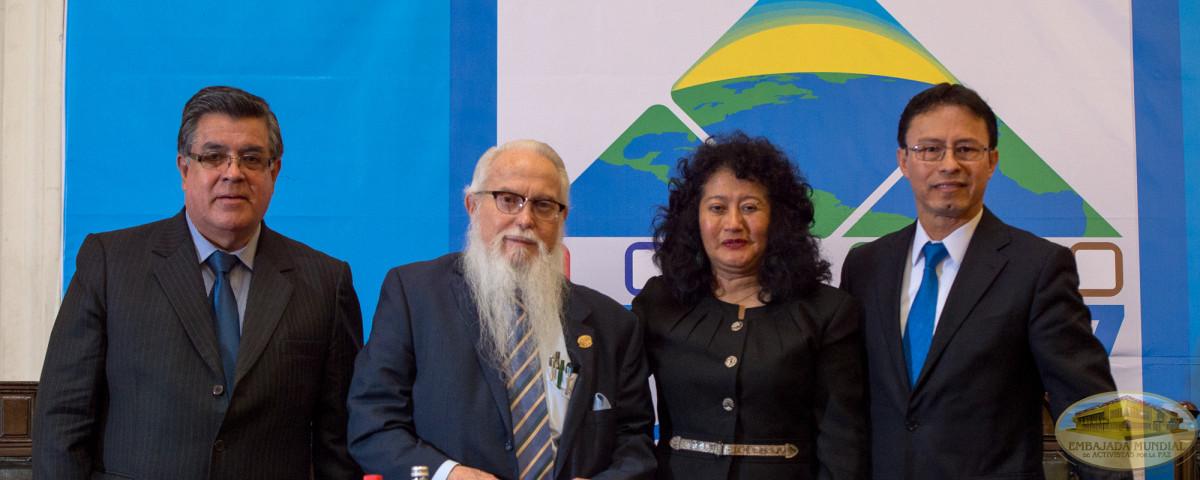The CUMIPAZ Judicial Session impulses an international justice for peace
The crime of Genocide is promoted as a capital crime
CUMIPAZ (Chile 2015) gave way with the judicial session, for the promotion of an international justice constructed on truth in the framework of human dignity and fundamental rights, a justice for peace.
"The crime of Genocide as a capital crime" was the opening topic developed by the first table, formed by Dr. William Soto, Global Ambassador of the GEAP; Dr. Yassmin Barrios Aguilar, Judge of the High Risk Court from Guatemala; Dr. Francisco Rozas Escalante, President of the Second Criminal Hall for Inmates Incarcerated from the Superior Court of Justice of Peru; and Dr. Camilo Montoya Reyes, Prosecutor before the High Court of Colombia.
Affirming that an autonomous and independent justice brings peace, Dr. Soto developed the topic "Prevention of Genocide, the UN and the ICC in the construction of a Justice for Peace" through which he called upon the authorities to join efforts and determinations to report and stop exterminations that occur before the silence and indifference of the States, international authorities and political leaders.
In this regard, he presented the project "Justice for Peace," which reinforces the obligation of States to prevent, criminalize and prosecute the crime of genocide and other major violations of human rights, among other international crimes; it also promotes education based on the respect for others as a main non-violent tool to prevent genocidal barbarism.
This initiative promotes among his lines of action the establishment of Regional Prosecutors of the International Criminal Court (ICC) to ensure immediate collection of evidence and timely investigation of international crimes.
"Today, in this Peace Integration Summit, the Global Embassy of Activists for Peace (GEAP) calls upon countries that have not ratified the Convention for the Prevention and Punishment for the Crime of Genocide and the Statute of Rome, to assume international commitment, and also to typify this behavior to be known as a Capital Crime. And the United Nations Organization to review and amend the Convention and the Rome of Statute," urged Dr. Soto.
Judicial Independence
Dr. Yassmin Barrios speaks from her experience in the judicial practice in Guatemala, on "The Crime of Genocide and its sociological and dogmatic characterization" by exposing national domestic cases that show the violation of Human Rights and severe attacks against human dignity, among them, the massacre of the Ixil population.
With this historic event she also explained the judicial process which a State must face to establish the prosecution of genocidal acts, supported by the Constitution, International Instruments and judicial independence.
Dr. Barrios emphasized: "Behavior of exclusive conduct, discrimination, should not be allowed; because this is where we find the foundation for the crime of genocide to occur."
“Justice that delays, is not justice.”
In the same direction of the session, Dr. Francisco Rozas spoke on the "Extension of protection to other groups of people excluded from the criminalization of genocide." While developing the topic, he emphasized the need of prompt justice, for which he proposed an acquisition of commitments for the realization of working hours in the States to reach this purpose.
"The substantial aspect of the crime of genocide also invites us to analyze some of the process that must be implemented in all countries. There are processes that take too long, processes that takes years; and I think, I also consider, that it is an aggression to due process, an infringement of due process. We believe that human rights and fundamental rights need to be addressed promptly, and that is justice; because justice that is delayed, is not justice." Dr. Rozas mentioned in his statement.
Ethnocide, the Other Side of Genocide
Another proposal in favor of justice for peace, promoted by the GEAP, was the criminalization and punishment of ethnocide as a form of genocide, developed by Dr. Camilo Montoya, who said: "while Genocide looks to physically destroy the group, Ethnocide intends to destroy everything that embodies the culture of a group”.
He further emphasized: "Since ethnocide is an attack against the spirit, genocide will be committed with a cultural death, even without having committed a crime of any physical assassination against any individual."
Dr. Montoya said that this proposal of the GEAP to criminalize ethnocide as a form of genocide has support in the International Criminal Law, specifically stated by the United Nations Organization for Education, Science, and Culture (UNESCO), Declaration of San Jose 1981 entitled "UNESCO and the Fight against Ethnocide."
The Judicial Session CUMIPAZ 2015 enables the integration of different nationalities and authorities and cultures converging on the need to strengthen national and international justice for peace.
